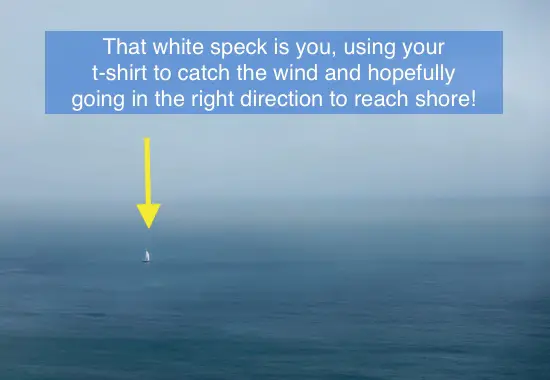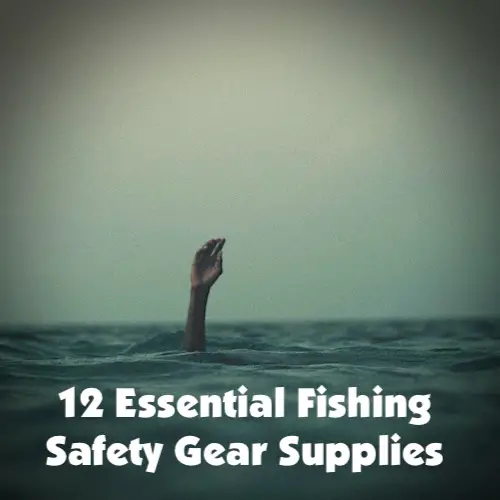When most of us go on a fishing trip, we’re thinking about all the things we need to catch more fish. Rods and reels, hooks, multiple lines, weights, floats, bait, cast nets, cooler, ice, money, food.
Some of us will stop to think for half a minute about what kind of extras we might like to have with us to make life more bearable if something goes wrong during the trip. I love thinking about this and I think I’ve taken the “Be prepared” Boy Scout motto way too seriously during my life, but it’s saved me a few times.
It’s probably good to give this topic a lot of thought before you go fishing because a lot could go wrong!
Essential Safety Gear to Bring with You on Your Fishing Trip!
- Wire-cutters. A small pair of wire cutters is one thing you just cannot forget unless you want to be walking around with a hook in the back of your head all day until you get home and can have someone remove it. With their wire-cutters.
- Tweezers. Not quite as important, but when you get a splinter on that wooden dock like I did a number of times at the old Gandy Bridge fishing pier on the St. Petersburg side, you eventually learn. You bring a couple of pair of tweezers because splinters suck! What else are they good for? Pulling out bee stingers and tarantula hairs. Ever grab a tarantula that was behind the railing and impossible to see? Yeah, I have. Not so fun! The tarantula “Mexican red rump” species Brachypelma vagans is not native in Florida but has been introduced.
- Nail clippers. OK, I think this covers the small metal tools to have. Nail clippers can cut the skin around a bee sting or splinter so you can reach it better with tweezers. Quite helpful. Probably even better are cuticle clippers.
- Knife. I lied. A knife is the last metal thing to bring. Some guys insist on those 28 tools in one knife type tools. There’s something to that, but really a pair of nail clippers, a real pair of scissors, a real metal file, and a real knife blade like a Ka-bar will serve you better than one multi-tool thing any day. Unless you get the one with the little magnifying glass that will help you start fires! I usually bring a bigger knife like a Ka-bar and a smaller Gerber folding knife with a 4-inch blade.
- Bandages, Wrap, Tape. For a cut of any size you’ll need some good bandages – the square ones you put right on the wound and some tape and gauze wrap to cover it. Be careful with getting saltwater into the wound. A lot of shallow water has streptococcus and staphlococcus bacteria waiting to infect wounds. If you get punctured by a hook or fish barb, think about a tetatus shot if you haven’t had one in the last few years.
- Betadine and/or Antibacterial Salve. Before you wrap a laceration make sure you cover it in one of these two to keep infection chances to a minimum.
- Hot Chemical Packs. You break up a plastic pack of chemicals so they mix and the pack gets quite warm. These are great for jellyfish stings, stingray barbs in the foot or leg, and scorpionfish (lionfish) or catfish barb envenomation. You’ll need a couple of these packs because they don’t stay warm for long. You’ll probably want to head straight home to get some warm water compresses right away.
- Mobile Phone. Charge up your battery to full before you go out. Keep the phone off until you need it. Keep it in a sealed waterproof bag if going out on a boat. Accidents can happen anytime, and sometimes weird and serious accidents you don’t expect to occur, do. Be prepared!
- Lifejacket. Having a good lifejacket with a whistle on it is essential if you’re kayaking or canoeing and you flip it or get a hole in the bottom. Speaking of that, it’s also a good idea to have a small roll of duct tape that can repair a hole in the boat from the outside until you get back to shore. Yes, it can be damn tricky trying to get tape to stick to the boat, but it doesn’t hurt to give it a try!
- Personal Emergency Locator GPS! If you’re on your kayak and lose your paddle a couple of miles from shore, you might not be getting back to shore within 24 hours. Always have a personal locator device like this one, that automatically alerts rescue services worldwide. You can send messages to people too. These devices will let you alert authorities and loved ones that you have a serious problem. Especially on the Atlantic side of the state where you could be floating off to jolly old England if you lose a paddle or a Hobie pedal system malfunctions.
- Compass. While on a boat and not able to see land, you’ll need to know which way to go even if the sun isn’t out to help. Bring a compass on your lifejacket with the whistle. If you’re really good, you’ll clip a waterproof light to your lifejacket too!
- Emergency Nutrition. A jar of peanut butter can go a long way! Nuts are packed with calories and protein and can help you get through an extended period of time without regular food.
- Water! Don’t forget fresh water. Even a plastic bag to catch water if it rains can be very helpful. One of these cool water purification units are like magic and not expensive. You can also store a couple of bottled waters in the hull of your kayak or bottom of your canoe or boat and you’ll be so glad you did if you ever need them.
You should have an emergency waterproof bag with the items listed above as well as a couple of lighters, lighter fluid, sunblock, rain poncho, foil blanket to wrap yourself if cold, money, extra throwaway phone, headlamp and extra batteries, eye wash, and whatever else you can think of.
I typically take enough food for 2-3 days when I go out on the kayak alone. I don’t deal well with hunger! Sports nutrition bars and gels like the kind ultra-runners use during races can give you the fuel you need to keep going for days.

Fishing is not inherently all that dangerous on a daily basis, but of course some weird accidents happen and the better prepared you are for them today will help you when you need it most. Carrying tweezers can be the difference between 5 minutes of pain and pain all day and into the evening as you try to fish and ignore it. It really just makes sense to be prepared while fishing for any sort of accident that causes a medical or health problem.
What kind of things have happened to me on a fishing trip where I required some of the things above?
- My little brother fell into ice-cold water on first day of trout season in Pennsylvania and didn’t have a floatation device and we didn’t have any blanket or warm cover for him. Story here.
- I stepped on a stingray tail at Clearwater Beach and didn’t know warm/hot water would reduce the pain. Story here.
- My girlfriend is being towed by the neck by a shark taking our trout. Story here.
- Various hooks in hands, backs, heads, feet, and ears.
- Splinters of all kinds. Bee stings.
Luckily I’ve never been lost at sea. There’s enough videos on YouTube of people’s experiences with this that I think I’ll never put myself in that situation without greatly over-preparing for such a thing. I couldn’t really imagine floating around in the ocean aimlessly for ten hours, ten days, or ten weeks.
It’s SO much better to be prepared for fishing accidents – Don’t you think?
[Images from unsplsh]
